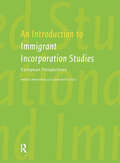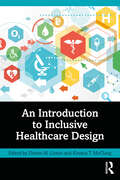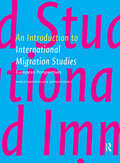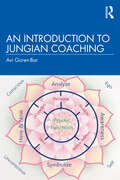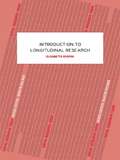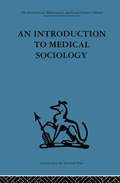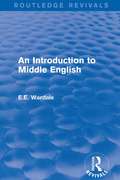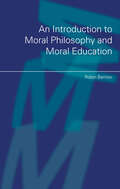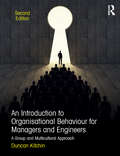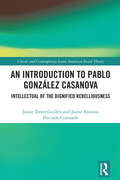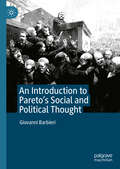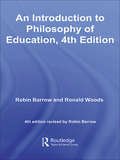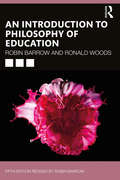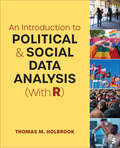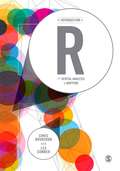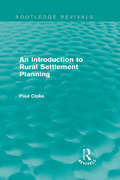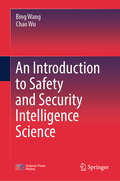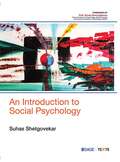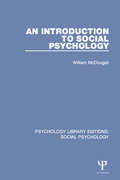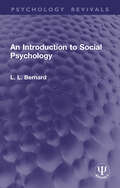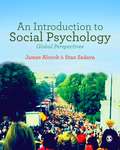- Table View
- List View
An Introduction to Immigrant Incorporation Studies: European Perspectives (IMISCOE Textbooks)
by Jan Rath Marco MartinielloFocusing mainly on the European experience including Eastern Europe, this important volume offers an advanced introduction to immigrant incorporation studies from a historical, empirical and theoretical perspective. Beyond incorporation theories, renowned scholars in the field explore incorporation in action in different fields, policy issues and normative dimensions.
An Introduction to Inclusive Healthcare Design
by Denise M. Linton Kiwana T. McClungAn Introduction to Inclusive Healthcare Design is a comprehensive guide to the design and facilitation of safe, healthy, equitable, and inclusive healthcare settings across a variety of scales. The book informs healthcare professionals, healthcare administrators, planners, designers in the healthcare sector, design students, and faculty about best practices and considerations for inclusive design.The primary theme for the book is design for all – considering the design of healthcare spaces through the lenses of inclusivity and social equity. Part 1 presents the reader with an overview of the variety of locations and types of healthcare settings. Part 2 provides a comprehensive overview of the principles of equitable and inclusive healthcare design and considers how these principles can be applied to the range of settings laid out in Part 1. The authors consider inclusivity-supportive infrastructure in primary and ancillary spaces within healthcare settings. Part 3 envisions the future of inclusive healthcare design, considering the integration of virtual reality and artificial intelligence, as well as addressing the ever more relevant issue of healthcare provision in settings at risk of natural disasters.
An Introduction to International Migration Studies: European Perspectives (IMISCOE Textbooks)
by Marco MartinielloFocusing mainly on the European experience including Eastern Europe, this important volume offers an advanced introduction to immigrant incorporation studies from a historical, empirical and theoretical perspective. Beyond incorporation theories, renowned scholars in the field explore incorporation in action in different fields, policy issues and normative dimensions. An advanced introduction to international migration studies from a historical, empirical and theoretical perspective. Types of migration and migration regulation are explored by respected scholars in the field. Focusing mainly on the European experience, including Eastern Europe.
An Introduction to Japanese Society
by Yoshio SugimotoEssential reading for students of Japanese society, An Introduction to Japanese Society now enters its third edition. Here, internationally renowned scholar, Yoshio Sugimoto, writes a sophisticated, yet highly readable and lucid text, using both English and Japanese sources to update and expand upon his original narrative. The book challenges the traditional notion that Japan comprises a uniform culture, and draws attention to its subcultural diversity and class competition. Covering all aspects of Japanese society, it includes chapters on class, geographical and generational variation, work, education, gender, minorities, popular culture and the establishment. This new edition features sections on: Japan's cultural capitalism; the decline of the conventional Japanese management model; the rise of the 'socially divided society' thesis; changes of government; the spread of manga, animation and Japan's popular culture overseas; and the expansion of civil society in Japan.
An Introduction to Japanese Society (Contemporary Japanese Society Ser.)
by Yoshio SugimotoAn Introduction to Japanese Society provides a highly readable introduction to Japanese society by internationally renowned scholar Yoshio Sugimoto. Taking a sociological approach, the text examines the multifaceted nature of contemporary Japanese society with chapters covering class, geographical and generational variation, work, education, gender, ethnicity, religion, popular culture, and the establishment. This edition begins with a new historical introduction placing the sociological analysis of contemporary Japan in context, and includes a new chapter on religion and belief systems. Comprehensively revised to include current research and statistics, the text covers changes to the labor market, evolving conceptions of family and gender, demographic shifts in an aging society, and the emergence of new social movements. Each chapter now contains illustrative case examples, research questions, recommended further readings and useful online resources. Written in a lively and engaging style, An Introduction to Japanese Society remains essential reading for all students of Japanese society.
An Introduction to Jungian Coaching
by Avi Goren-BarBased on the psychology of Carl Jung, this illuminating new book invites coaches to extend their toolbox with deep, creative, and efficient professional methods that derive from a new perspective on coaching. In using the unconscious archetypes as a practical active psychological database for change, the Jungian coach can contribute significant modification in the coachee’s expected behavior. Jungian Coaching can be applied in evaluating the coachee, the team, and the corporation. This book translates Jungian psychology into simple comprehensive concepts. Each chapter translates theoretical concepts and rationale to thepractice of coaching. Illustrated with practical examples from the corporate world and life coaching, it offers Jungian Coaching tools and techniques. By integrating the Gestalt psychology principle of the "here and now" into Jungian concepts, the author develops a new coaching tool that enables an activation of archetypes as a useful and empowering coaching experience. A valuable introductory resource for all those involved in coaching relationships, this book can empower coachees and serve as a compass for personal growth. It will be of great interest to practicing coaches, executives, human resource managers, consultants, and psychotherapists.
An Introduction to Longitudinal Research (Social Research Today)
by Elisabetta RuspiniOne of the major changes in the social science research landscape in recent years has been the introduction of computerised panel surveys in Europe and the US which make longitudinal data widely available to graduate students for the first time. Elisabetta Ruspini here provides a concise yet comprehensive introduction to the issues involved in this kind of research. This book:* Defines the concept of longitudinal research* Gives guidance on sources of longitudinal data in Europe and the US and their strengths and weaknesses* Discusses the choices that need to be made in this kind of research - for instance the advantages and disadvantages of certain types of research data and of different types of analysis* Highlights some of the problems involved, e.g. the issue of comparability within longitudinal research
An Introduction to Medical Sociology (Social Science Paperbacks Ser.)
by David TuckettTavistock Press was established as a co-operative venture between the Tavistock Institute and Routledge & Kegan Paul (RKP) in the 1950s to produce a series of major contributions across the social sciences. This volume is part of a 2001 reissue of a selection of those important works which have since gone out of print, or are difficult to locate. Published by Routledge, 112 volumes in total are being brought together under the name The International Behavioural and Social Sciences Library: Classics from the Tavistock Press. Reproduced here in facsimile, this volume was originally published in 1976 and is available individually. The collection is also available in a number of themed mini-sets of between 5 and 13 volumes, or as a complete collection.
An Introduction to Middle English
by E.E. WardaleFirst published in 1937, this book supplies a history of the living growth of the English language from Old English to the medieval period. It offers an in-depth study of the growth of vocabulary through literature and social interaction, bringing out the fact that it is chiefly words that foreign influence has affected — leaving sentence structure almost unaltered. Isolative and combinative changes in phonology, the accidence of nouns and plurals, pronouns and adverbs, and verbs are also examined in detail, along with a general overview of the features Middle English and a brief outline of each dialect’s most striking characteristics.
An Introduction to Moral Philosophy and Moral Education
by Robin BarrowThis book presents and argues for a moral theory which draws on most of the major theoretical positions to some degree, but it also spells out the limits and boundaries of a moral theory. In doing so, it exposes a number of common confusions and misunderstandings about morality, and presents a strong argument for some indisputable truths in relation to the moral sphere. Divided into four parts, the book covers the key issues within moral philosophy: part one provides a lucid and powerful account of the nature and limits of moral theory, sharply distinguishing it from religion part two outlines a positive moral theory by exploring the defining principles of morality and the reasons for being moral part three distinguishes moral values from others such as ecological, health and safety and sexual values part four is concerned with the implications of our moral understanding for moral education. While this book concentrates on argument and ideas, a commentary to each chapter provides historical context and contemporary reference points. It will prove an invaluable resource for students of both Education and Philosophy.
An Introduction to Organisational Behaviour for Managers and Engineers: A Group and Multicultural Approach
by Duncan KitchinAn Introduction to Organisational Behaviour for Managers and Engineers: A Group and Multicultural Approach gives a comprehensive overview of how organisations work, with a special focus on group and team working, and issues of diversity and intercultural management. This second edition has been updated throughout, drawing on the latest literature, along with: a new chapter on organisational change, a process which all managers and engineers will encounter on the job; case studies and illustrations showing theories in action; more cross-referencing between chapters, showing how topics are interlinked. This concise textbook not only provides a practical introduction to organisational behaviour for management students, but is also specifically geared towards the needs of engineering students and professionals.
An Introduction to Pablo González Casanova: Intellectual of the Dignified Rebelliousness (Classic and Contemporary Latin American Social Theory)
by Jaime Torres Guillén Jaime Antonio Preciado CoronadoThis book is an introduction to Pablo González Casanova, giant of Latin American sociology. It examines his work across history, sociology, political science, and anthropology, exploring in depth his writings on the university, democracy, the new sciences, alternatives to capitalism, the humanities, equity with social justice, patriarchal domination, and the struggle for planet earth. This book provides insights into a foundational Latin American perspective on global realities. It argues that Pablo González Casanova contributes original elements for the construction of a critical theory in the social sciences and humanities of Mexico, Latin America, and the Caribbean. With an enriching interdisciplinary perspective, this book will be of interest to scholars from a range of specialized interests in sociology, political science, philosophy, anthropology, cultural studies, scientific epistemology, methodology, and critical thinking in the alternative field to capitalism.
An Introduction to Pareto's Social and Political Thought
by Giovanni BarbieriThis book analyses Pareto&’s social and political thought a hundred years after his death, showing how the structure of the scholar&’s works is generally quite clear (contrary to what is commonly presumed), and how the maintenance of the social and political systems&’ equilibrium represents Pareto&’s main research focus . In particular, the aim of this book is to demonstrate how the author considers the &‘right middle path&’ – in the social, economic, and political arenas – as the only way capable of ensuring social cohesion. The book will be of interest to scholars and researchers of sociology, sociological and political theory, and political science.
An Introduction to Philosophy of Education
by Robin Barrow Ronald WoodsThis introductory text, now in its fourth edition, is a classic in its field. It shows, first and foremost, the importance of philosophy in educational debate and as a background to any practical activity such as teaching. What is involved in the idea of educating a person or the idea of educational success? What are the criteria for establishing the optimum balance between formal and informal teaching techniques? How trustworthy is educational research? In addition to these questions, which strike to the heart of the rationale for the educative process as a whole, the authors explore such concepts as culture, creativity, autonomy, indoctrination, needs, interests and learning by discovery. In this new updated edition, the authors draw on the latest research in genetics to argue that education is uniquely human and is essentially what develops us as humans. Resisting modern tendencies to equate knowledge with opinion, and value judgements with taste, this book leads the reader into the business of philosophising and champions the cause of reason in education.
An Introduction to Philosophy of Education
by Robin Barrow Ronald WoodsThis introductory text, now in its fifth edition, is a classic in its field. It shows, first and foremost, the importance of philosophy in educational debate and as a background to any practical activity such as teaching. What is involved in the idea of educating a person or the idea of educational success? What are the criteria for establishing the optimum balance between formal and informal teaching techniques? How trustworthy is educational research? In addition to these questions, which strike to the heart of the rationale for the educative process as a whole, the authors explore such concepts as culture, creativity, autonomy, indoctrination, needs, interests, and learning by discovery. Updates to this edition include new chapters on religious education and moral education, as well as questions for reflection at the end of each chapter.
An Introduction to Political and Social Data Analysis (With R)
by Thomas M. HolbrookAn Introduction to Political and Social Data Analysis (With R) provides students with an accessible overview of practical data analysis while also providing a gentle introduction to R. By starting with statistics first and using just enough R code to generate results, this text helps students focus on learning how to do data analysis while slowly gaining confidence in using R as they progress through the material. This book is structured around learning by doing. Students can follow along in each chapter by reading about statistics and their applications in R, and then running the R code on their own as they work through contemporary political science and social science examples. Author Thomas M. Holbrook patiently explains each step in in the process, avoiding overly complicated jargon and commands. Exercises at the end of chapters feature both conceptual and calculation-based questions so students can check their understanding of data analysis and practice using R. At the end of the semester, students can confidently add skills in data analysis with R to their resumes.
An Introduction to Political and Social Data Analysis (With R)
by Thomas M. HolbrookAn Introduction to Political and Social Data Analysis (With R) provides students with an accessible overview of practical data analysis while also providing a gentle introduction to R. By starting with statistics first and using just enough R code to generate results, this text helps students focus on learning how to do data analysis while slowly gaining confidence in using R as they progress through the material. This book is structured around learning by doing. Students can follow along in each chapter by reading about statistics and their applications in R, and then running the R code on their own as they work through contemporary political science and social science examples. Author Thomas M. Holbrook patiently explains each step in in the process, avoiding overly complicated jargon and commands. Exercises at the end of chapters feature both conceptual and calculation-based questions so students can check their understanding of data analysis and practice using R. At the end of the semester, students can confidently add skills in data analysis with R to their resumes.
An Introduction to R for Spatial Analysis and Mapping
by Chris Brunsdon Lex Comber"In an age of big data, data journalism and with a wealth of quantitative information around us, it is not enough for students to be taught only 100 year old statistical methods using 'out of the box' software. They need to have 21st-century analytical skills too. This is an excellent and student-friendly text from two of the world leaders in the teaching and development of spatial analysis. It shows clearly why the open source software R is not just an alternative to commercial GIS, it may actually be the better choice for mapping, analysis and for replicable research. Providing practical tips as well as fully working code, this is a practical 'how to' guide ideal for undergraduates as well as those using R for the first time. It will be required reading on my own courses." - Richard Harris, Professor of Quantitative Social Science, University of Bristol R is a powerful open source computing tool that supports geographical analysis and mapping for the many geography and 'non-geography' students and researchers interested in spatial analysis and mapping. This book provides an introduction to the use of R for spatial statistical analysis, geocomputation and the analysis of geographical information for researchers collecting and using data with location attached, largely through increased GPS functionality. Brunsdon and Comber take readers from 'zero to hero' in spatial analysis and mapping through functions they have developed and compiled into R packages. This enables practical R applications in GIS, spatial analyses, spatial statistics, mapping, and web-scraping. Each chapter includes: Example data and commands for exploring it Scripts and coding to exemplify specific functionality Advice for developing greater understanding - through functions such as locator(), View(), and alternative coding to achieve the same ends Self-contained exercises for students to work through Embedded code within the descriptive text. This is a definitive 'how to' that takes students - of any discipline - from coding to actual applications and uses of R.
An Introduction to Rural Settlement Planning (Routledge Revivals)
by Paul ClokeThis book, first published in 1983, provided the first thorough and informative introduction to the theory, practice and politics of rural settlement planning. It surveys the conceptual and ideological leanings of those who have developed, implemented and revised rural settlement practice, and gives detailed analysis of planning documentation to assess the extent to which policies have been successfully implemented. Paul Cloke assesses the shortfalls of rural planning and resource management and suggests methods by which a sustainable rural future might be attained. This reissue provides essential background and a comprehensive handbook for those with an interest in rural settlement planning.
An Introduction to Safety and Security Intelligence Science
by Bing Wang Chao WuThis book is dedicated to the introduction and research on safety and security intelligence science. It is the first time to put forward the idea of intelligence-led safety management, which demonstrates distinct interdisciplinary characteristics. It caters to the needs of safety and safety intelligence in the era of big security and big intelligence, and enhances the academic value of safety intelligence research. Whether you are engaged in practical work or scientific research on safety and intelligence, or are interested in issues about safety and intelligence, this academic book will prove to be a worthy collection.
An Introduction to Social Psychology
by Suhas ShetgovekarThis textbook will help students of psychology and related disciplines to understand the fundamentals of social psychology and its application in the Indian context An Introduction to Social Psychology offers a thorough understanding of all basic concepts and methods of social psychology in a lucid and interactive manner. It enables readers to grasp the idea of the self or the individual in the social context and understand the recent developments in the area of applied social psychology. The book is written for undergraduate and postgraduate students of social psychology, sociology, social works and other related disciplines. Every chapter begins with a well-defined set of learning objectives and includes review exercises and project-based activities. Readers would be introduced to the fundamentals and the emerging perspectives in the subject through numerous illustrations, exercises, activities, research data, case studies and links to further reading. Key Features The language used emphasises clarity and avoids technical jargons to aid ease of understanding Covers current perspective, trends and research in social psychology, with a special focus on the Indian context Text supported by tables, figures and boxed-examples to aid in understanding and retention of concepts learned Inclusion of chapter-wise review questions and multiple choice questions to test learner's progress and comprehension of the subject
An Introduction to Social Psychology (Psychology Library Editions: Social Psychology)
by William McDougallOn its first publication in 1908 this pioneer book received immediate acclaim and was thought to have probably done more than any other single publication to stimulate study of the foundations of social behaviour. Professor McDougall was the most powerful advocate of an idealistic outlook on human life and activity, and his ideas continued to attract attention even when published in paperback form in 1960.
An Introduction to Social Psychology (Psychology Revivals)
by L. L. BernardOriginally published in 1927, An Introduction to Social Psychology represents an attempt at a more synthetic type of treatment of the field than had previously been given. The author felt that the time had arrived when “schools” of social psychology may properly be regarded as obsolete and the subject as a whole may be presented systematically. At the time social psychology was emerging as a separate discipline and overlapped a very large portion of social science, psychology and education. In this respect it was central to all psychological and social science disciplines. This volume treats the subject from the standpoint of the more objective factors which integrate the personality and its responses in a social environment. Today it can be read in its historical context.This book is a re-issue originally published in 1927. The language used and views portrayed are a reflection of its era and no offence is meant by the Publishers to any reader by this re-publication.
An Introduction to Social Psychology: Global Perspectives
by James Alcock Stan SadavaPsychology recognises no borders. The relationships between people and the groups they form are determined by similar principles no matter where in the world they come from. This book has been written to introduce students from all countries and backgrounds to the exciting field of social psychology. Recognising the limitations that come from studying the subject through the lens of any one culture, James Alcock and Stan Sadava have crafted a truly international social psychology book for the modern era. Based on classic and cutting-edge scholarship from across the world, An Introduction to Social Psychology encourages mastery of the basics as well as critical thinking. Incorporating relevant insights from social neuroscience, evolutionary theory and positive psychology, it offers: Chapters on crowd behaviour and applied social psychology Discussion of new means of social interaction, including social media Relevant insights from social neuroscience, evolutionary theory and positive psychology A companion website at study.sagepub.com/alcocksadava featuring extensive additional resources for students and instructors
An Introduction to Social Psychology: Global Perspectives
by James Alcock Stan SadavaPsychology recognises no borders. The relationships between people and the groups they form are determined by similar principles no matter where in the world they come from. This book has been written to introduce students from all countries and backgrounds to the exciting field of social psychology. Recognising the limitations that come from studying the subject through the lens of any one culture, James Alcock and Stan Sadava have crafted a truly international social psychology book for the modern era. Based on classic and cutting-edge scholarship from across the world, An Introduction to Social Psychology encourages mastery of the basics as well as critical thinking. Incorporating relevant insights from social neuroscience, evolutionary theory and positive psychology, it offers: Chapters on crowd behaviour and applied social psychology Discussion of new means of social interaction, including social media Relevant insights from social neuroscience, evolutionary theory and positive psychology A companion website at study.sagepub.com/alcocksadava featuring extensive additional resources for students and instructors
